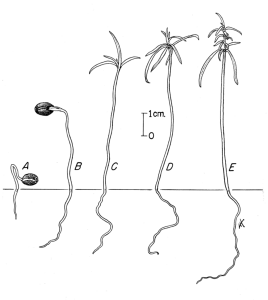 In an earlier post, I listed some lessons that helped the Davis Wiki become widely used. One of these lessons that stood out is the idea that wikis need content to breed content. The founders of the Davis Wiki created 500 “seed” articles to get their wiki off the ground and to give potential editors the idea of the purpose of the Davis Wiki. In a comment to my post, Novak asked that if we were to to create “seed” articles, “what would be the right strategy to distribute the effort and engage different user groups, academic vs staff vs students, and across various disciplines and fields?” and I wanted to follow up with a few thoughts about this question and about seed articles in general.
In an earlier post, I listed some lessons that helped the Davis Wiki become widely used. One of these lessons that stood out is the idea that wikis need content to breed content. The founders of the Davis Wiki created 500 “seed” articles to get their wiki off the ground and to give potential editors the idea of the purpose of the Davis Wiki. In a comment to my post, Novak asked that if we were to to create “seed” articles, “what would be the right strategy to distribute the effort and engage different user groups, academic vs staff vs students, and across various disciplines and fields?” and I wanted to follow up with a few thoughts about this question and about seed articles in general.
First, though, it should be noted that the UBC Wiki is hardly a barren place. There are currently 5,642 pages in the UBC Wiki (this number includes all created pages, such as categories, redirects, and talk pages). Since the MediaWiki installation and the current UBC Wiki went live in 2009, 1,291 people have registered for an account and 46 people have edited the UBC Wiki within the last week, which isn’t bad for August when things are slow at an university. The UBC Wiki is being used.
However, if the UBC Wiki can be seen as having two grand purposes, that of a collaborative work space and that of an information repository, then much of the content created to date fits mostly in the former category. The UBC Wiki is being used, but it’s not being used to it’s full potential. The Wiki is clearly seen as a tool for individuals and groups; however, I’m not sure if it’s seen as a tool for the entire university.
I think the seed articles that we create should exemplify how the UBC Wiki is a university wide tool by capturing or compiling information that does not exist in a centralized, easily up-datable space. For example, this information might be informal student knowledge, such as the real differences between the Place Vanier and Totem Park residences. As a Google search reveals, this information is something students are looking but they would have to read several forums and blog postings to get a somewhat clear picture. The UBC Wiki is a great place to compile that info – students can easily updated and discuss the topic as it changes over time. Likewise, it’s hard to get a clear picture of all that UBC is doing on the topic of climate change research. The UBC Wiki could centralize that knowledge by pointing to all the different projects, departments, people, or whatever that are currently engaged on a specific topic. As new projects get started or as people change research approaches, there wouldn’t be any procedural roadblocks for updating that info; anyone could edit that page.
As Novak points out, the university community is not a homogeneous crowd and seed articles might be different depending on what their focus is; however, I don’t think they will be all that different based on the audience. Instructors might look at an article called Bars and Pubs on Campus and undergrad students might read an article on UBC research efforts into terrestrial climate change. Thus, the distribution of seed articles should be thought more in terms of topics rather than audiences; I’m not sure what would be the best strategy for creating the proper topic distribution other than to say it is very important to have a mix of articles from all different aspects of a university: from the cheapest places for lunch to what genetic research is being done here.
The most important part of seed articles, though, is simply planting the idea in users’ minds of what the wiki could be.
Image: Public domain picture from USDA Plants Database